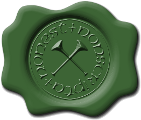
| Home | FAQs | Rules | Archives | Articles | Jobs | Links | KWHSS | OSCAR | SCA.org |
Collected Name Resources from LoARs (2010-present)
Articles from Juliana de Luna, Lillia de Vaux, and Alys Mackyntoich
Back to Collected Name Resources from LoARs- Double Given Names -
October 2012 - Juliana de Luna Link to LoAR Cover Letter
With the passing of the Rules for Submissions, we need to consider the situation with double given names (what Americans today might call a first name and a middle name). There are several languages for which we will register double given names, but consider them a step from period practice. As steps from period practice in names no longer exist, those practices must either be registerable or not.
People with double given names can be found in many different parts of Europe, but people with single given names are the vast majority in every time and place. Double given names coupled with bynames (as opposed to a single given name coupled with a byname that is an unmarked patronymic) are mainly a phenomenon of the later parts of our period.
In the British Isles, double given names are always rare. They're found in late period England. In Wales, double given names are not clearly found, but unmarked patronymic bynames often look like double given names, so a name like Thomas William Jones can be found in Welsh.
Current precedent makes double given names in Scots a step from period practice. In Scotland, there are two late period examples of double given names, both royal. We do not generally use royalty as a model for general naming. However, given the broad overlap between the Scots naming pool and the English one, most combinations of Scots given names could be redocumented as English combinations. Therefore, it makes sense to allow double given names to be registered even when the names are found only in Scots.
There is no evidence of double given names in Gaelic in our period. As such, they are not registerable. This is true for Gaelic in both Ireland and Scotland. Moreover, double given names are not registerable in Anglicized Irish. Unlike Scots, which is a language with its own naming rules, Anglicized Irish remains through the end of our period just a way of writing down Gaelic names using English script. As such, double given names are not registerable without evidence of the practice there either. In some cases, Anglicized Irish names are identical to English names; where the name elements can be documented as English names, they may be treated as English (which has double given names).
We have evidence of double given names for most of the Romance languages of southern Europe, including Spanish, Catalan, and Italian. Italian is the only language in which they're relatively common (though never more than a few percent of names) and the only language in which we've found three given names.
The situation is more complex in northern Europe. Double given names are found in German, but not in Dutch. We have no evidence of double given names in Scandinavia before 1600.
Double given names are found in Russia; the most normal pattern is a Christian name followed by a native Russian name, but Paul Wickenden notes "Semenova (1969: 88-9) notes that there are exceptions to this pattern, with both names being Christian in origin or both Russian, or with the order simply reversed (i.e., Russian -- Christian)." Therefore, any combination of given names is registerable. We have evidence of double given names in Polish as well. We have no evidence that supports double given names for other Eastern European languages. This may reflect a lack of data, but we still require evidence.
We have no evidence of double given names in Arabic or other Middle Eastern languages.
Back to Collected Name Resources from LoARsThe heraldry.sca.org site is copyright 1995-2024 Society for Creative Anachronism, Inc. The copyright of certain portions of heraldry.sca.org are retained by the original contributors as noted.
External links are not part of the heraldry.sca.org web site. Inclusion of a page or site here is neither implicit nor explicit endorsement of the site. Further, SCA, Inc. is not responsible for content outside of heraldry.sca.org. For information on how SCA uses collected and submitted data, please see the Privacy Policy.
Paper texture used with permission from GRSites.com.